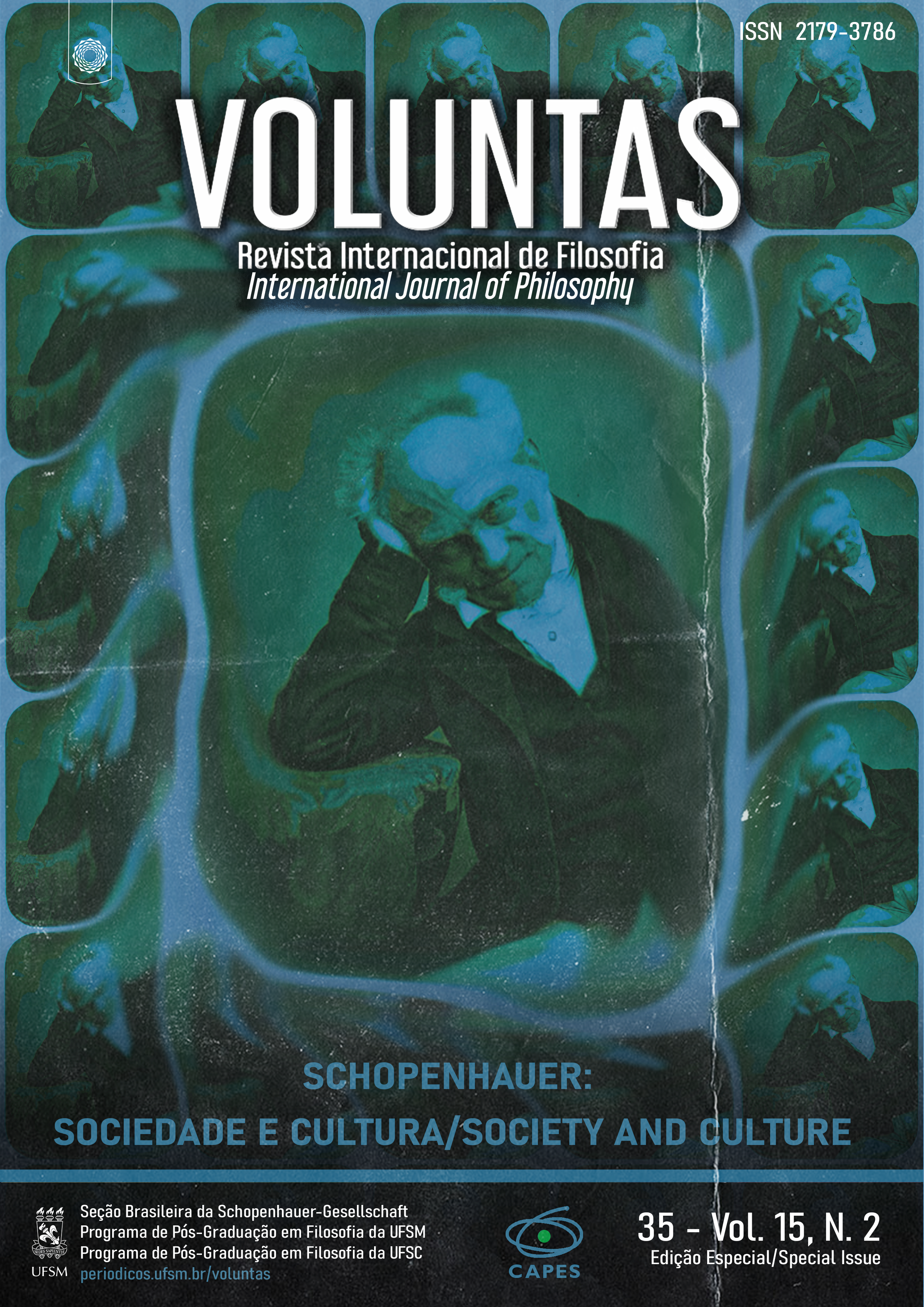Nietzsche as a heretic of Schopenhauer School
DOI:
https://doi.org/10.5902/2179378689375Keywords:
Schopenhauer, Schopenhauer School, The heretics, NietzscheAbstract
According to the systematic classification of the Schopenhauer School that has now become canonical, followers of Schopenhauer who do not accept the metaphysics of the will and who independently develop other aspects of Schopenhauerian thought are considered heretics. This is precisely the case of Friedrich Nietzsche, who, although he considered Schopenhauer his “teacher and disciplinarian”, was never an uncritical Schopenhauerian. This contribution therefore aims to criticize the traditional interpretation, which sees the first Nietzsche as an orthodox Schopenhauerian and the second Nietzsche as an anti-Schopenhauerian, and to show how the three phases in which Nietzsche’s thought is articulated correspond to three different approaches to Schopenhauerian thought.
Downloads
References
DECHER, F. Der eine Wille und die vielen Willen: Schopenhauer-Mainländer-Nietzsche. Nietzsche-Studien, v. 12, p. 221-238, 1996.
DECHER, F. Wille zum Leben - Wille zur Macht: eine Untersuchung zu Schopenhauer und Nietzsche. Würzburg, 1984. p. 68.
FAZIO, D. M. Die Schopenhauer-Schule. In: SCHUBBE, D.; KOßLER, M. (Org.). Schopenhauer-Handbuch. Stuttgart-Weimar, 2014. p. 270-275.
FAZIO, D. M. A ética na escola de Schopenhauer: o caso de Paul Rée. Ethic@: Revista Internacional de Filosofia da Moral, v. 11, p. 87-98, 2012.
FAZIO, D. M. Arthur Schopenhauer e la sua scuola. A cura de F. Ciracì, D. M. Fazio e F. Pedrocchi. Schopenhaueriana 1. Lecce, 2007.
FAZIO, D. M. La controversia sul pessimismo. In: ECO, U.; FEDRIGA, R. (Org.). Storia della Filosofia. Bari-Roma: Laterza, 2014. v. 3, p. 94-98.
FAZIO, D. M. L'eco originaria: la metafisica della musica in Schopenhauer, Wagner e Nietzsche. Schopenhaueriana 13. Lecce, 2021.
JENSEN, A. K. A Heretical student in the Schopenhauerian School. Nietzsche-Studien, v. 50, p. 47-69, 2021.
JENSEN, A. K. Per me l'uomo era tutto: Nietzsche e Schopenhauer sul sé. In: FAZIO, D. M.; VITALE, M. (Org.). Prospettive: tredici saggi a duecento anni dal Mondo come volontà e rappresentação di Arthur Schopenhauer. Schopenhaueriana 14. Lecce, 2022. p. 161-187.
NIETZSCHE, F. A gaia ciência. Tradução, notas e posfácio de Paulo César de Souza. São Paulo, 2017. Af. 99, 357, p. 180-185, 362-369.
NIETZSCHE, F. Além do bem e do mal. Tradução de Márcio Pugliesi. Curitiba, 2001. Af. 186, p. 100.
NIETZSCHE, F. Crepúsculo dos ídolos. Tradução, notas e posfácio de Paulo César de Souza. São Paulo, 2012. 7, 21, p. 90-91.
NIETZSCHE, F. Fragmentos póstumos (1884-1885). Tradução de Marco Antônio Casanova. Rio de Janeiro, 2015. 26 [85], 38 [12], p. 179, 624-625.
NIETZSCHE, F. Fragmentos póstumos (1885-1887). Tradução de Marco Antônio Casanova. Rio de Janeiro, 2013. 9 [42], 10 [118], p. 293, 432.
NIETZSCHE, F. Fragmentos póstumos (1887-1889). Tradução de Marco Antônio Casanova. Rio de Janeiro, 2012. 11 [101], 14 [25], 14 [121], 14 [222], p. 39, 208, 272, 356.
NIETZSCHE, F. Genealogia da moral. Tradução, notas e posfácio de Paulo César de Souza. São Paulo, 1998. III, 5, p. 92.
NIETZSCHE, F. Humano, demasiado humano I. Af. 110, 164, p. 134, 7-8.
NIETZSCHE, F. Humano, demasiado humano II. Tradução, notas e posfácio de Paulo César de Souza. São Paulo, 2005-2017. Opiniões e sentenças diversas, af. 5, p. 22-23.
NIETZSCHE, F. Nachlass (1875-1879). Kritische Studienausgabe. Hrsg. von G. Colli und M. Montinari. München, 1999. Bd. 8, 27 [43], 27 [80], p. 495, 500.
NIETZSCHE, F. Rückblick auf meine zwei Leipziger Jahre. In: Werke. Kritische Gesamtausgabe. Hrsg. von G. Colli und M. Montinari. Berlin-New York, 1967 e seg. (KGW) I VI 60 [1], p. 613-614.
SCHOPENHAUER, A. Carteggio con i discepoli. A cura di D. M. Fazio. Schopenhaueriana 12. Lecce, 2018.
SCHOPENHAUER, A. O mundo como vontade e como representação. Tomo I. Tradução, apresentação, notas e índices de Jair Barboza. São Paulo, 2013. p. 484, 489-490, 493
Published
How to Cite
Issue
Section
License
Copyright (c) 2024 Domenico Fazio

This work is licensed under a Creative Commons Attribution-NonCommercial-ShareAlike 4.0 International License.
The submission of original manuscripts to this journal implies the transference, by the authors, of the copyrights for printed and digital publication. The copyrights of a published manuscript belong ultimately to the author, and only the copyright for its first publication is reserved to the journal. Authors may only use the same results in other publications explicitly indicating this journal as the medium of the original publication.
Licence
Attribution-NonCommercial-ShareAlike 4.0 International (CC BY-NC-SA 4.0) - This license lets others remix, tweak, and build upon your work non-commercially, as long as they credit you and license their new creations under the identical terms.






